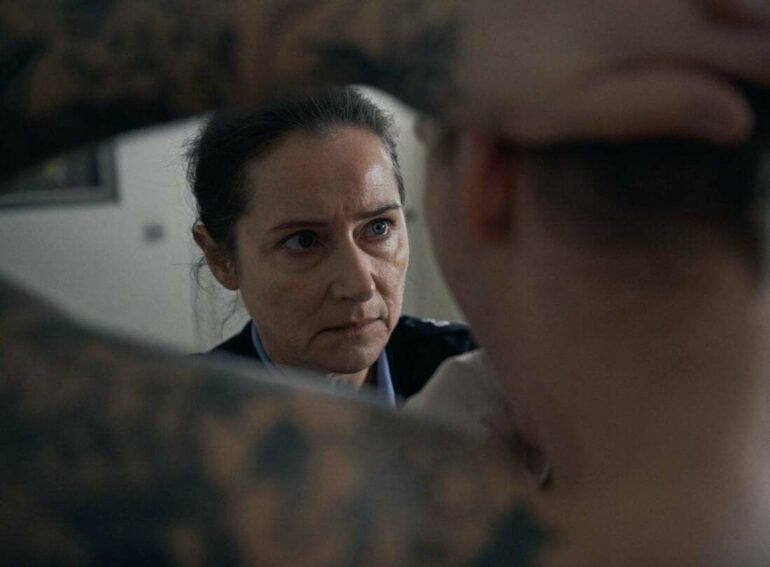Written by: Geoffrey Macnab
15.02.24
Nordic films and drama series are again a major presence at this week’s Berlinale.
Maverick Swedish director Gustav Möller is in the festival’s main competition with the Danish thriller Sons (Vogter), sold by French powerhouse Les Films du Losange - and produced through Nordisk Film with support from Nordisk Film & TV Fond. This film is about a female prison officer who comes face to face with a young man from her past.
Other competition entries have backing from the Nordic countries or were made with Nordic co-producers. For instance, Nepalese director Min Bahadur Bham’s Shambhala, set in a village high in the Himalayas, is co-produced by Norwegian outfit Ape&Bjørn. It’s sold by Belgian outfit Best Friend Forever.
Iranian directors Maryam Moghaddam and Behtash Sanaeeha are in competition with their feature My Favourite Cake (Keyke mahboobe man), sold by Totem Films in France, and made with Swedish co-producer Hobab.
Meanwhile, Tunisian-Canadian director Meryam Joobeur’s competition entry, Who Do I Belong To (Mé el Aïn), was made with Norwegian co-producer Eye Eye Pictures.
Nordic representation is also found in the Berlinale Panorama. Danish director Birgitte Stærmose’s Afterwar, shot over a period of 15 years using doc and fiction elements, is in competition for the documentary award. This film is produced by Magic Hour Films in Denmark with support from Swedish Vilda Bomben and Finnish Bufo.
Another Panorama title, Swedish director Levan Akin’s Georgian film “Crossing”, is a Co-production with Swedish RMV Film along with Danish Adomeit Film.
Chinese director Lin Jianjie’s Brief History Of A Family is co-produced by Tambo Film in Denmark.
Lân Phạm Ngóc’s Cu Li Never Cries (Cu Li Không Bao Ggiò’ Khóc), a Vietnamese drama also in Panorama, has Norwegian backing through co-producers, Ape&Bjørn / Storm Films in Oslo. It’s sold by Square Eyes.
Topical doc No Other Land, made by a Palestinian-Israeli collective, was co-produced by Antipode Films in Norway.
Also in Panorama, Sex, Dag Johan Haugerud’s subversive drama questioning views on sexuality and gender, was produced by Motlys in Norway. It’s sold by Berlin-based m-appeal. This too has backing from Nordisk Film & TV Fond.
Forum entry The Nights Still Smell of Gunpowder (As noites ainda cheiram á pôlvora), a Mozambique-made civil war documentary from Inadelso Cossa, was co-produced by Norwegian outfit STÆR.
Nordic countries are also making a splash in this year’s Berlinale Series Market. There will be a special session, Focus Finland: Cold Cases & Hot Flashes - The Rise of Crime and Relationship Dramas in challenging times. Light will be cast here on several series created in Finland, among them the female-led crime investigation series The Paradise (Paratiisi), the suspense drama Seconds (Sekunnit), and menopause comedy Hormones! (Hormonit!) There will also be a showcase of upcoming Nordic drama organised by the TV Drama Vision team from the Gothenburg Film Festival.
On the books front, Icelandic hit novel in the Áróra Investigation Series, Cold as Hell (Helköld sól) by Lilja Sigurðardóttir is one of the ten hot novels selected for the Books at Berlinale as being potential blockbuster films in waiting.
The festival is already shaping up as a minor triumph for the Norwegian fund Sørfond, whose budget recently doubled from $280,000 a year (3 million NOK) to $470,000 (5 million NOK) as part of the Norwegian government’s campaign to support human rights and freedom of speech in the DAC countries. The Fund was set up in 2011 to develop the film industry in the so-called DAC countries (low and middle income countries eligible for OECD aid).
Four of the recent projects Sørfond has supported have been selected for Berlin: competition entry Shambhala; Pham Ngoc Lan’s Panorama entry Cu Li Never Cries; Meryam Joobeur’s Golden Bear contender Who Do I Belong To; and Forum entry The Nights Still Smell of Gunpowder, directed by Inadelso Cossa.
“It’s definitely something to celebrate. Having four films in the Berlinale is quite exceptional,” Sørfond project leader Mads Wølner Voss trumpeted the Berlin success.
The films supported by Sørfond don’t always receive wide distribution across the Nordic countries. However, they are showcased at the Films from the South Festival (held every November), where they’ll be premiering in the Nordics.
The Fund pumps in €60,000 into dramas and €45,000 into feature docs. The money comes largely without strings. The main requirement is that the sum is spent in the countries of origin.
Leading Norwegian producers like Dyveke Graver and Andrea Berentsen Ottmar of Eye Eye Pictures, Verona Meier from Ape&Bjørn and Elisa Fernanda Pirir of Stær Productions are all involved in the current crop of Sørfond titles selected for the Berlinale.
“They are entering these projects with a really idealistic motivation,” commented Dag Asbjørnsen, Head of International Relations at the Norwegian Film Institute.
